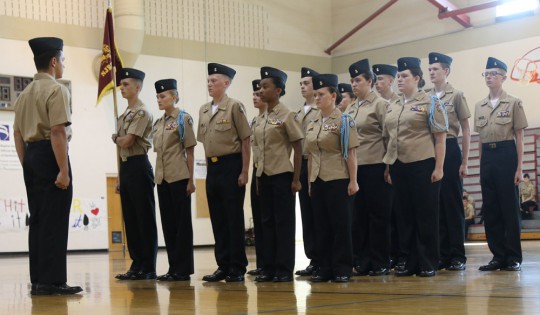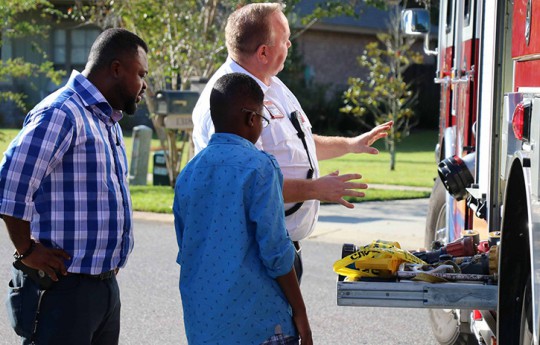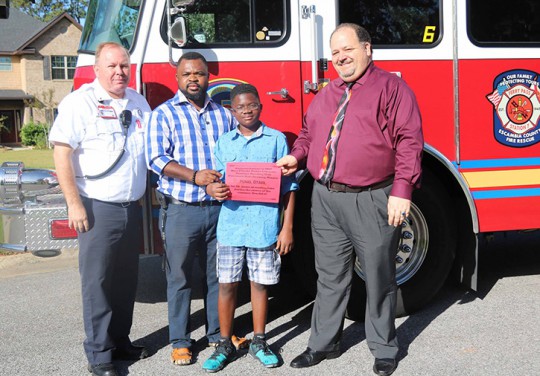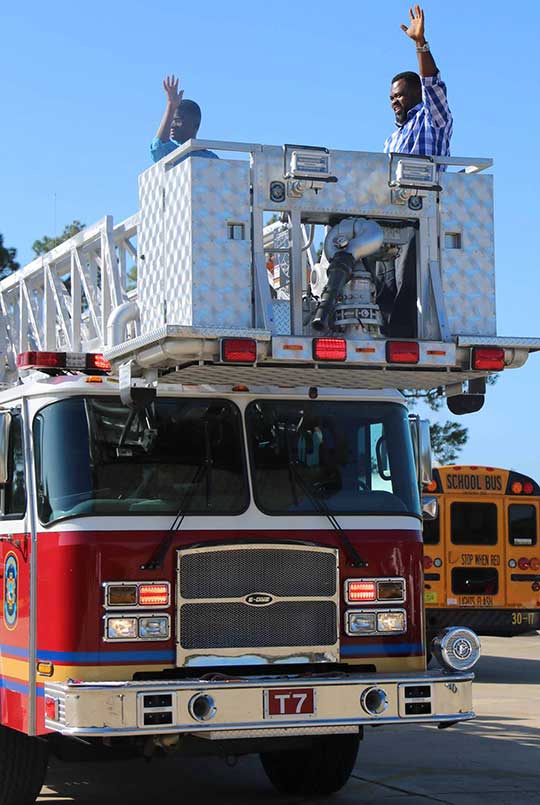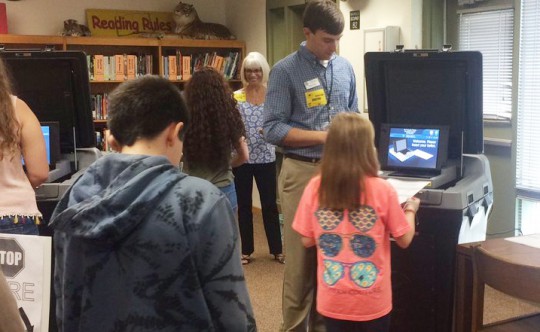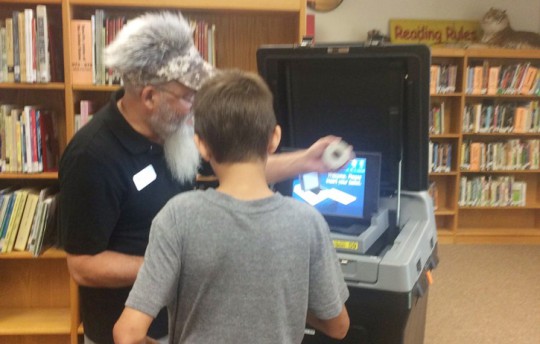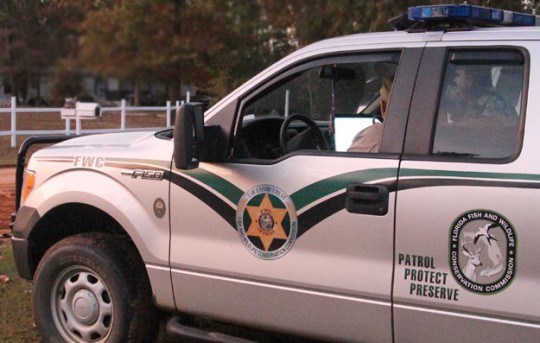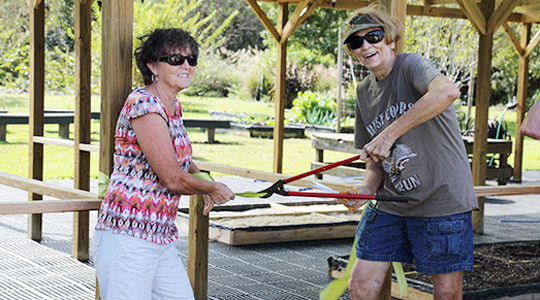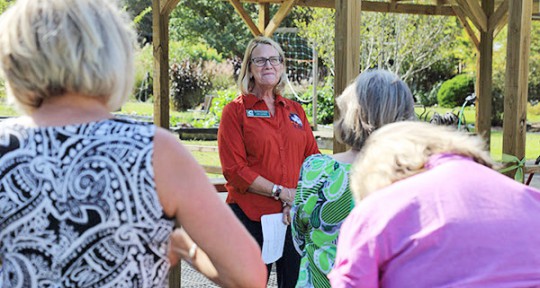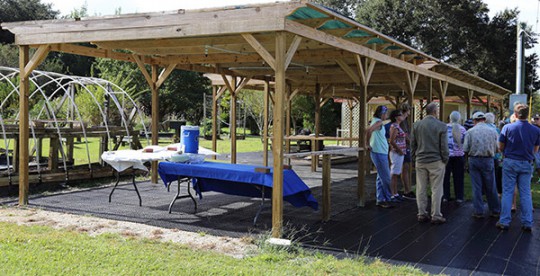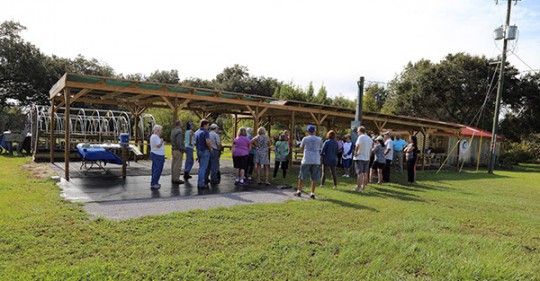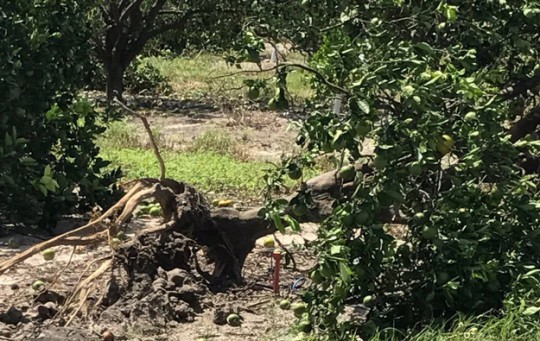Northview NJROTC Annual Inspection Held (With Photo Gallery)
October 5, 2017
Northview High School’s NJROTC Annual Inspection was held Wednesday at the school, with cadets undergoing face to face scrutiny with a Navy captain.
 Cap. Mark Goto, Commanding Officer, Navy Medicine Operational Training Center, NAS Pensacola, conducted the inspection. The day’s events began with a personnel inspection, drill demonstration and a pass-in-review in the school gym. The commander also conducted a financial record review, briefings, administrative inspections, supply inspections and more.
Cap. Mark Goto, Commanding Officer, Navy Medicine Operational Training Center, NAS Pensacola, conducted the inspection. The day’s events began with a personnel inspection, drill demonstration and a pass-in-review in the school gym. The commander also conducted a financial record review, briefings, administrative inspections, supply inspections and more.
One by one, Capt. Goto went face to face with each cadet, asking them questions about their NJROTC experience and conducting a complete inspection of their uniform.
“I want you to think big dream, set big goals, and decide today where you want to take that journey,” Goto told the cadets.
“Make this world…a better place,” he said.
Northview’s NJROTC is led by Company Commander Cadet LCDR Oscar Rodriguez and Executive Officer Cadet Lt. Wyatt Morris.
For a photo gallery from the inspection, click here.
Several cadets were promoted during Wednesday’s review:
Exemplary Personal Appearance award/ribbon:
Cadet Rebekah Amerson
Cadet Haley Black
Cadet Destiny Braddock
Cadet Keaton Brown
Cadet Lance McLaughin
Cadet Andria Odom
Cadet Maxwell Odom
Cadet Kyle Sconiers
Cadet Ryan Sconiers
Cadet Joshua Wilson
The following cadets were recognized for their “Superior Performance” in the unit. They were given a command coin by Capt. Goto.
Cadet Oscar Rodriguez
Cadet Hayley Ward
Cadet Ryan Sconiers
Cadet Maggie Lane
Cadet Keaton Brown
Cadet David Lamb
NorthEscambia.com photos, click to enlarge.
Ransom Middle Student Wins Firetruck Ride To School
October 5, 2017
Peniel Otabil, 11, arrived at Ransom Middle School in grand style Wednesday morning on a firetruck.
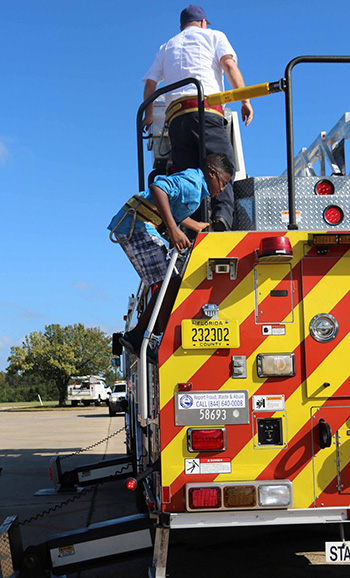 Otabil was one of six winners in the West Florida Public Libraries’ Summer Reading Club contest to receive a firetruck ride to school. The firetruck rides were the prize for children ages 6-11 who read more than 50 hours during the Summer Reading Club, which ran from May 30 through July 31.
Otabil was one of six winners in the West Florida Public Libraries’ Summer Reading Club contest to receive a firetruck ride to school. The firetruck rides were the prize for children ages 6-11 who read more than 50 hours during the Summer Reading Club, which ran from May 30 through July 31.
This year, 2,884 children from infant to 17 years old signed up to participate in the Summer Reading Club, and 130 children from the participating libraries read at least 50 hours. Of those, 72 were ages 6-11 and were eligible for the drawing for the six firetruck rides. Other prizes included tool sets, bicycles and pedal cars.
Ransom Seventh Graders Vote On Their Favorite Things
October 5, 2017
Seventh grade students at Ransom Middle School voted on their “My Favorite Things” on Wednesday.
The 463 students cast their ballots on real voting machines provided by the office of Escambia County Supervisor of Elections David Stafford, providing them an opportunity to learn about the voting process.
Winners of the Ransom Middle School seventh grade vote on “My Favorite Things” were:
Automaker – Chevrolet
College – Alabama
Fast Food – Chick-Fil-A
President – Donald Trump
Music – Hip Hop
Sport – Football
School Subject – P.E.
(Complete results are at the bottom of this page.)
Pictured: Seventh grade students at Ransom Middle School cast their vote for “My Favorite Things”. Photos for NorthEscambia.com, click to enlarge.
FWC Law Enforcement Report
October 5, 2017
The Florida FWC Division of Law Enforcement reported the following activity during the weekly period ending September 28 in Escambia and Santa Rosa counties.
ESCAMBIA COUNTY
 Officer McHenry received a complaint that an individual was operating a PWC in a reckless manner in a small canal off Pensacola Bay. Shortly after arriving, the PWC was observed being operated at night and violating the idle speed zone. After being addressed, the operator of the PWC turned toward Officer McHenry, got within 15 feet of the dock and then fled. At a nearby boat ramp, a trailer for two PWCs was located and one was missing. The operator who fled was the owner of the second PWC. Officer McHenry contacted the operator and was arrested for fleeing and transported to jail.
Officer McHenry received a complaint that an individual was operating a PWC in a reckless manner in a small canal off Pensacola Bay. Shortly after arriving, the PWC was observed being operated at night and violating the idle speed zone. After being addressed, the operator of the PWC turned toward Officer McHenry, got within 15 feet of the dock and then fled. At a nearby boat ramp, a trailer for two PWCs was located and one was missing. The operator who fled was the owner of the second PWC. Officer McHenry contacted the operator and was arrested for fleeing and transported to jail.
Lieutenant Hahr was patrolling in Perdido River Wildlife Management Area (WMA) when he observed a man and woman trying to smoke methamphetamine while the woman’s three children were present. Both subjects were charged with possession of methamphetamine, possession of drug paraphernalia and accessing the management area after hours and were booked in the Escambia County Jail.
SANTA ROSA COUNTY
Officer Hutchinson and Investigator Milstead observed two men selling shrimp on the side of Highway 90. They conducted a license and resource inspection and discovered that neither subject had the proper license to sell saltwater products. Both men were issued notices to appear for selling saltwater products without a retail dealers license.
This report represents some events the FWC handled over the past week; however, it does not include all actions taken by the Division of Law Enforcement. Information provided by FWC.
NorthEscambia.com photo.
Closed Primary Elections Draw Scrutiny From Escambia’s Stafford, Other Elections Bosses
October 5, 2017
As Florida’s population grows and more residents shun traditional party affiliations, voters are befuddled, if not angry, about the state’s closed-primary system, including the use of write-in candidates, Escambia County Supervisor of Elections David Strafford and two other local elections supervisors testified Wednesday.
Stafford said the write-in candidate process can get voters “amped up” if they believe it is violating the fairness of the election, although it is legally justified.
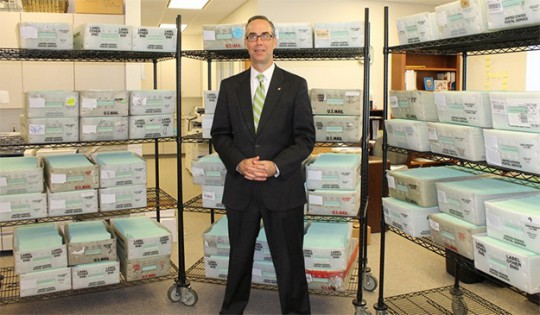 “At some point, you have to question what effect does that have on the electorate writ large. Does it increase confidence? Does it decrease confidence?” Stafford said. “We’re in the business, particularly here in Florida, of trying increase confidence in the election process.”
“At some point, you have to question what effect does that have on the electorate writ large. Does it increase confidence? Does it decrease confidence?” Stafford said. “We’re in the business, particularly here in Florida, of trying increase confidence in the election process.”
“When it comes to the primary election, our voters are confused,” Broward County Supervisor of Elections Brenda Snipes told the state Constitution Revision Commission’s Ethics and Elections Committee.
Many new voters move to Florida from other states with more open voting systems as opposed to Florida’s closed primaries, which are restricted to voters who are registered with parties. Florida is one of nine states using a closed-primary system.
“We have people coming from all over the country, and they bring with them the experiences that they have had and what they know,” Snipes said. “It’s difficult for them to understand.”
Adding to the confusion is that more voters are opting not to join the Republicans or Democrats but register with “no party affiliation” or in a host of minor parties. No-party affiliation is the fastest growing segment of the electorate and is particularly popular with young people, with more than one out of every four Florida voters falling into that category.
But no-party voters can’t vote in Democratic or GOP primaries, although they can cast their ballots in non-partisan primary races and in general elections.
Florida has a provision that opens primaries to all voters when all of the candidates are from the same party and there is no general-election opposition. But it has been undermined by a state Division of Elections ruling, upheld by the courts, that says the presence of a general election write-in candidate closes primaries, even if only one party has a primary election.
The net effect of the so-called “write-in candidate loophole” is that the primary winner ends up as the only name on the general election ballot, virtually assuring a win.
Asked how widely the write-in candidate loophole was being used to close primaries, Polk County Supervisor of Elections Lori Edwards said her “educated guess” was that it could occur in approximately 10 out of 67 counties in an election cycle, although some counties had more of a “propensity” for using it.
“It’s not every day, every place. But it does occur,” Edwards said.
Snipes said the use of write-in candidates in Broward, the county with second-highest voter registration, is fairly common.
“What I see happen quite often is the write-in candidate is put into the race as a tool to close the race down,” Snipes said, saying many write-in candidates even drop out before the general election.
Edwards said the Florida State Association of Supervisors of Elections, which represents all 67 elections supervisors, would not take a position on proposed constitutional changes for the primary system, since it would be a conflict to advocate or oppose measures where supervisors had to count ballots.
But all three elections supervisors testified resolving voter confusion or complaints about the primary system could increase voter participation in the primaries. Edwards noted only 24 percent of voters turned out for last year’s primary election, while 75 percent participated in the general election.
The Constitution Revision Commission, which has the ability to put constitutional amendments on the November 2018 ballot, is already considering one measure to address the controversy over write-in candidates closing primaries.
Sherry Plymale, a member of the commission’s Ethics and Elections Committee, advanced an amendment this week from Palm Beach County State Attorney David Aronberg that would let all voters participate in a primary if there is no general election-opposition or if the only opposition comes from write-in candidates.
Steven Hough of Florida Fair and Open Primaries talked to the committee about his proposal (700575) to change Florida’s closed-primary system to a “top-two” system where all voters could participate in primary elections.
Patterned after election systems now used in California and Washington, Hough said the revision would place all candidates for an office in the primary, with the top two vote-getters advancing to the general election.
For Hough’s proposal to advance, it would have to be sponsored by a Constitution Revision Commission member and win support from at least nine other members. It could also be embodied in a proposal filed by commission members, who have until Oct. 31 to submit their proposed constitutional amendments.
by Lloyd Dunkelberger The News Service of Florida
Pictured: Escambia Count Supervisor of Elections David Stafford. File photo.
Master Gardeners Celebrate Improved Space
October 5, 2017
UF/IFAS Escambia County Extension and its Master Gardeners volunteer group celebrated a newly-remodeled outdoor propagation and teaching space with a ribbon cutting at the Extension Office in Cantonment.
Along with being a propagation space, the renovated space behind the Extension Office will serve as an outdoor classroom for the community, offering hands-on learning opportunities on a variety of gardening-related topics.
“The community will be able to come out here and profit from seeing what we’re doing, getting their hands on it, hearing one of our Master Gardeners talk about a certain plant that they’re interested in, and how they can take that back to their own home and be successful in their garden,” said Ann Luther, Escambia County Master Gardener volunteer.
Renovations to the space included new flooring to replace old buckling floors that created a safety hazard, as well as raising the area’s roof, Luther said. The improvements totaled about $8,000 and were paid for by Master Gardener fundraisers.
“The Escambia County Extension Service is excited to see the new addition of our Master Gardeners propagation and teaching area,” Escambia County Extension Director Nick Simmons said. “The Master Gardeners are a valuable asset to our broad array of services to the citizens of Escambia County. Their expertise and experience with horticultural techniques provide the research-based information that clients seek to improve their home garden, lawn and landscape. The new teaching area will provide hands-on learning and allow for a safe environment for everyone to enjoy.”
The Escambia County Master Gardener Program supports the county’s Extension Agent and Horticulture Program, contributing more than 179,886 hours of service since 1987.
Luther said the group is happy to see the two-month renovation process completed so that the area can continue to provide educational opportunities for the community.
“Everybody’s been excited to get back to be able to propagate to put back in our own gardens, which is the demonstration gardens, for this area for the public to see,” she said. “So the ribbon cutting denotes a new beginning of successes in the past, and that will bridge into more and important teamwork and successes in the future.”
Irma’s Agriculture Toll Tops $2.5 Billion
October 5, 2017
Hurricane Irma caused more than $2.5 billion in damage to Florida’s agriculture industry, with growers and nurseries suffering big losses, according to a preliminary report released by the state Department of Agriculture and Consumer Services.
Citrus growers, already struggling because of citrus greening disease, felt the biggest impact, with losses to crops and trees approaching $761 million, followed by the nursery industry at almost $624 million.
“Florida agriculture took it on the chin as Hurricane Irma pummeled the state,” said Agriculture Commissioner Adam Putnam, who called the $2.5 billion figure “only an initial assessment.”
“We’re likely to see even greater economic losses as we account for loss of future production and the cost to rebuild infrastructure,” Putnam added.
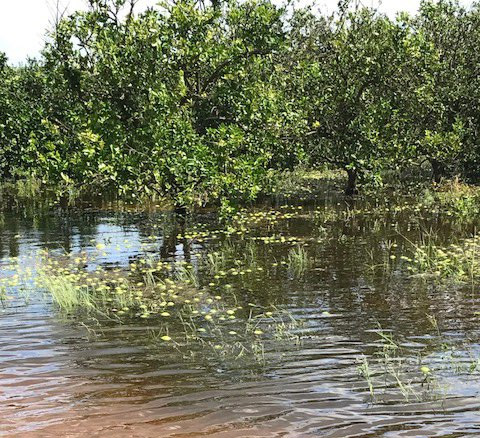 A department report said estimates have not been made on infrastructure losses sustained by some growers and on damage to such things as internal farm roads, dikes, water-control structures and retention areas. The report is based on satellite imagery, statistics, and early surveys of the industry.
A department report said estimates have not been made on infrastructure losses sustained by some growers and on damage to such things as internal farm roads, dikes, water-control structures and retention areas. The report is based on satellite imagery, statistics, and early surveys of the industry.
The state Senate Agriculture Committee is scheduled to discuss the impact of Irma on the agriculture industry during a meeting Oct. 12, just before the release of the first U.S. Department of Agriculture forecast for the citrus growing season.
Shortly after the storm, citrus growers were reporting losses from 40 percent in Central Florida to 100 percent in Southwest Florida. Irma hit the Florida Keys on Sept. 10 and then made a second landfall in Southwest Florida.
The newly released report, compiled by Department of Agriculture and Consumer Services Chief Economist Sergio Alvarez, estimates 421,176 acres of citrus were affected in Collier, Hendry, Lee, Brevard, Glades, Charlotte, St. Lucie, Highlands, Indian River, Okeechobee, DeSoto, Hardee, Osceola, Polk and Martin counties.
The nursery industry estimated that 46,204 acres of greenhouse, nursery, and floriculture production was affected.
Growers also project that labor in preparing nurseries for the arrival of Irma, as well as cleaning up debris after the storm passed, led to $42.5 million in costs, Alvarez wrote.
The cattle industry damage assessment is at $237.5 million, while the dairy industry is estimated to have $11.8 million in losses.
Ranchers estimated 100 animals died in the storm, according to Alvarez. Also, the storm could result in 7 percent of cows not breeding this year. Also, stress will cause an estimated 187,000 calves awaiting shipment to out-of-state feedlots to each lose about 50 pounds, a projected cost of $75 per calf.
The sugar industry appears to have $383 million in damage, with an estimated 534,324 acres affected.
The report noted higher harvesting costs are expected as much of the crop was lodged into the ground by the storm. Also, growers are worried about the ability to locate and use sugarcane for seed to plant the next crop.
“This issue may result in reduced acres planted for the first harvest in the 2018-2019 season,” Alvarez wrote.
Vegetable and fruit growers — excluding citrus — face $180 million in damage, with an estimated 163,679 acres impacted by the storm.
“Fortunately, the planting season for most of these crops was just getting started, and most crop losses will happen due to shortened production season, market distortions, and reduced yields resulting from higher pest pressure due to dilution of pesticides,” Alvarez wrote.
Alvarez noted that some blueberry growers said Irma’s winds ripped entire blueberry bushes from the ground, with one grower reporting that 125 acres of blueberry bushes were completely ripped from their beds.
“Land preparation and planting costs for an acre of blueberries in Florida is around $16,568 per acre, as reported in blueberry crop budgets,” Alvarez wrote. “An estimated 500 acres statewide have suffered the same fate, bringing the cost of replanting berry bushes to $8,284,000.”
by Jim Turner, The News Service Of Florida
NorthEscambia.com Is Best Of The Coast ‘Best Website’ Runner-up
October 5, 2017
 NorthEscambia.com joins CatCountry98.7 as runner-ups in the Independent News Best of the Coast “Best Website” category.
NorthEscambia.com joins CatCountry98.7 as runner-ups in the Independent News Best of the Coast “Best Website” category.
We are extremely humbled at the honor, and wish to thank our readers for being part of the NorthEscambia.com family. We would also like to offer our congratulations to our friends, news partners and “Best of the Coast” winners at Cat Country 98.7 including Candy Cullerton and Brent Lane, NewsRadio 1620 including morning host Andrew McKay, and WEAR 3 including Christina Leavenworth and Sue Straughn.
October 5, 2017
Thomas A. Martin, age 77, of Cantonment, was called home October 3, 2017. He was born November 26, 1939, in Montgomery, AL, to the late Herbert and Murray Martin.
Tom was a 40 year veteran of the Escambia County Sherriff’s Office, where he served through five sheriffs. He was a man everyone loved and respected. Tom spent his retired years hunting, fishing and spending time with his family.
He is preceded in death by his parents; siblings Michael Martin and Terrie Young.
Those left to cherish his memory are his devoted wife Susan “Sue” Martin; children Kim (John Harrington) Matthews, Carl (Pam) Hemperley, Chris (Iris) Courtney, and Margaret Louis Bell; 14 grandchildren; 11 great-grandchildren and one great-great-grandchild; and a great many aunts, nieces, nephews, cousins and close friends. Visitation will be from 5-+7 p.m., Friday, October 6, 2017, at Faith Chapel Funeral Home North. A memorial service will be at 2:00 p.m., Saturday, October 7, 2017, at the funeral home. Donations in lieu of flowers may be made in Tom’s memory to the Sacred Heart Foundation, 5151 N 9th Ave, Pensacola, FL 32504.
State To Miss Deadline For Marijuana Licenses
October 4, 2017
Health officials won’t be able to meet a legislatively mandated Tuesday deadline to hand out five new medical-marijuana licenses, the head of the state’s Office of Medical Marijuana Use said.
Christian Bax, the marijuana office’s executive director, blamed the delay on Hurricane Irma and a pending challenge to a recently passed law that ordered the Department of Health to expand the number of medical marijuana licenses.
The law, passed during a June special session, was designed to carry out a November constitutional amendment that broadly legalized medical marijuana in Florida. A key part of the law was increasing the number of operators in what could turn into a highly lucrative industry.
 The law called for an overall increase of 10 licenses, some of which have already been awarded, by Oct. 3. It also specified that one license go to a black farmer who had been part of settled lawsuits about discrimination by the federal government against black farmers.
The law called for an overall increase of 10 licenses, some of which have already been awarded, by Oct. 3. It also specified that one license go to a black farmer who had been part of settled lawsuits about discrimination by the federal government against black farmers.
A lawsuit filed this month challenges the constitutionality of that part of the law, alleging that the statute is so narrowly drawn that only a handful of black farmers could qualify for the license. The lawsuit, filed by Panama City farmer Columbus Smith, contends that the measure is what is known as an unconstitutional “special law.”
In a letter to legislative leaders, Bax wrote that his office has “worked diligently to implement” the new law, but that the issuance of five new medical marijuana licenses by Tuesday posed an “extraordinarily challenging deadline.”
In addition, response and recovery efforts related to Hurricane Irma “necessitated the mobilization of all available department assets for nearly two weeks,” Bax wrote.
Bax also blamed his office’s inability to meet the deadline on Smith’s lawsuit.
“The OMMU (Office of Medical Marijuana Use) is aware of its important role in continuing to move this process forward to provide patient access as quickly and safely as possible. However, recent history has emphasized the importance of getting the MMTC (medical marijuana treatment center) licensure process right the first time,” he wrote.
Marijuana industry insiders have long believed that the agency would not meet the deadline, but Bax’s letter informing lawmakers of the delay made it official. As late as last week, a Department of Health spokeswoman said that the deadline remained “the goal.”
The evolution of the medical-marijuana industry in Florida has been fraught with legal and administrative challenges since its inception after a 2014 law legalized low-THC treatments for a limited number of patients.
Bax pointed out that 13 administrative challenges were filed after the agency issued the first medical-marijuana licenses in 2015. The agency is still in litigation over two of the challenges, he said.
The upcoming licenses will be the first time the state has opened the application process to businesses that did not participate in the first selection process in 2015, creating intense interest in what could be one of the biggest medical-marijuana markets in the nation.
Bax’s office developed a new system to evaluate the applications, relying on an outside vendor to supply “subject matter experts” to use a “blind-testing” process to grade the submissions. Requests for quotations from potential contractors were due a week ago — just seven days before Tuesday’s deadline.
State Sen. Rob Bradley, a Fleming Island Republican who has been instrumental in the development and passage of the state’s medical marijuana laws, praised Bax’s office for the revised selection system but called the delay a letdown.
“I’m pleased with the rule that set up the process for reviewing and approving applications. It’s a much better process than the low-THC process, and I think it will produce better results,” he told The News Service of Florida in a telephone interview. “I’m disappointed that they didn’t complete their work in a timely manner with regard to the approval of the five licenses that are subject to competitive applications. They need to finish their work by the end of the year and before session starts (in January).”
Still, Bradley said: “I’d rather have them right than do it quick.”
“What I would like to know is what their revised timeline is,” Rodrigues told the News Service.
Rodrigues said he expects an update from health officials during legislative committee meetings next month.
by Dara Kam The News Service of Florida



